CMSECenter for Moral Science and Education
Reitaku CMSE collaboration with Boston CCSR at the Kevin Ryan Symposium on Service Learning
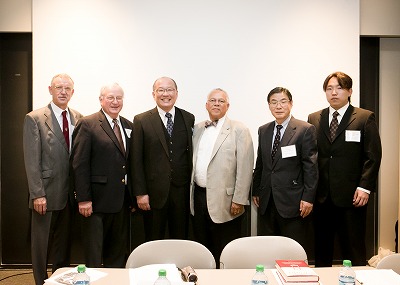 The Center for Character and Social Responsibility at Boston University hosted a symposium about service learning on September 26, 2013, entitled ‘Service Learning Strengthening Character Across Cultures: Japan and the United States’. It featured presentations by four contributors from Reitaku University on diverse ways of strengthening character and fostering moral decision making through service learning. A cross-cultural dialogue then ensued; initially in the form of comments by professors at Boston University’s School of Education, it then broadened into a wider discussion with members of the audience.
Professor Steve Ellenwood, current Faculty Director of the CCSR, opened proceeding by welcoming all those attending the symposium. He then introduced Professor Hardin Coleman, Dean of Boston University’s School of Education, who offered some wide-ranging thoughts on the topic of service learning.
The Center for Character and Social Responsibility at Boston University hosted a symposium about service learning on September 26, 2013, entitled ‘Service Learning Strengthening Character Across Cultures: Japan and the United States’. It featured presentations by four contributors from Reitaku University on diverse ways of strengthening character and fostering moral decision making through service learning. A cross-cultural dialogue then ensued; initially in the form of comments by professors at Boston University’s School of Education, it then broadened into a wider discussion with members of the audience.
Professor Steve Ellenwood, current Faculty Director of the CCSR, opened proceeding by welcoming all those attending the symposium. He then introduced Professor Hardin Coleman, Dean of Boston University’s School of Education, who offered some wide-ranging thoughts on the topic of service learning.
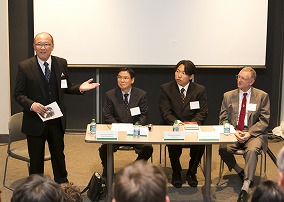 President Nakayama then made the following key-note address :
“….It is a great honour for me to have this opportunity to offer you some remarks at the beginning of today’s CCSR Kevin Ryan Symposium. The success that it will undoubtedly enjoy will be attributable to everyone present here with us: to our distinguished American colleagues, of course, who I know will demonstrate admirable courage and profound knowledge in presenting and discussing their ideas; but to you also, all the members of our distinguished audience, whose generous support of the activities of CCSR I greatly value and appreciate.
As to ourselves, we have journeyed here to learn from you and to add new dimensions to our understanding of both Japanese and American cultures. So, on behalf of Reitaku University and its Center of Moral Science and Education, may I express my sincerest and deepest gratitude to you, to all those involved in the preparations for this symposium, and to the benefactors who have laid the basis for our ongoing joint endeavors, in particular Dean Coleman, Dr. Ryan, Dr. Lerner, Dr. Bohlin and Dr. Ellenwood.
At Reitaku, our Center of Moral Science and Education aims to contribute on a broad front to the promotion of moral education in society by conducting education and research in Moralogy, the moral science that forms the spiritual foundation of our university.
President Nakayama then made the following key-note address :
“….It is a great honour for me to have this opportunity to offer you some remarks at the beginning of today’s CCSR Kevin Ryan Symposium. The success that it will undoubtedly enjoy will be attributable to everyone present here with us: to our distinguished American colleagues, of course, who I know will demonstrate admirable courage and profound knowledge in presenting and discussing their ideas; but to you also, all the members of our distinguished audience, whose generous support of the activities of CCSR I greatly value and appreciate.
As to ourselves, we have journeyed here to learn from you and to add new dimensions to our understanding of both Japanese and American cultures. So, on behalf of Reitaku University and its Center of Moral Science and Education, may I express my sincerest and deepest gratitude to you, to all those involved in the preparations for this symposium, and to the benefactors who have laid the basis for our ongoing joint endeavors, in particular Dean Coleman, Dr. Ryan, Dr. Lerner, Dr. Bohlin and Dr. Ellenwood.
At Reitaku, our Center of Moral Science and Education aims to contribute on a broad front to the promotion of moral education in society by conducting education and research in Moralogy, the moral science that forms the spiritual foundation of our university.
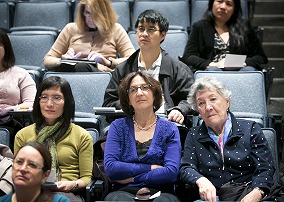 The common theme of our symposium today, “Service Learning Strengthening Character Across Cultures: Japan and the United States,” may possibly suggest to some that, in terms of its major educational outcomes, moral development is not exactly same as the pro-social development which you expect from what is called service learning. And it is true that pro-social development does imply a broader set of social and life skills than moral development. But I would still make the argument that if moral education is an integral part of character education, moral development must be also an essential component of character development.
According to the Western classical pedagogies of Greek philosophers such as Plato and Aristotle, moral education has the following three aspects; logos, the province of critical ethical thinking; pathos, which is connected to our emotional make-up; and ethos, which involves relationships and moral empathy, and the connection between word and deed. Such a perspective suggests a solution to a current problem with our university curricula, for we often find that university programs in ethics alone are not very effective in facilitating the advance of our students to a higher level of moral reasoning and development. Our curricula seem to be somewhat deficient in the social and behavioural approach that must be present if we are to spur the development of their moral competencies. This suggests that practical and social experiences are often more important for our students than gaining a cognitive understanding of ethics in the classroom, and this is why we need to promote service learning in our university education, so that those we teach can fulfil their true potential.
Both as teachers and academics, then, we need to shed more light on the positive impact that service learning can have on the psychological development of our students. Of course this is not to argue that the cognitive element is unnecessary or unimportant. On the contrary, we most certainly do need academic reflection and discussion as well as the objective evaluation of the educational outcomes of service learning. Beyond that, though, our most important task in developing character education is to learn how to integrate the three factors of logos, pathos and ethos holistically, and to facilitate their active presence in the delivery of the curriculum.
I am sure that our deliberations today will help us to progress towards this goal, so by way of conclusion, let me cite some lines, slightly re-arranged, from John Milton’s Samson Agonistes. My sincere hope is that this symposium will flourish in the manner of the final words I shall quote. “…..though we oft doubt/ What th’ unsearchable dispose/ Of highest wisdom brings about…All is best.” Thank you very much for your attention.”
The common theme of our symposium today, “Service Learning Strengthening Character Across Cultures: Japan and the United States,” may possibly suggest to some that, in terms of its major educational outcomes, moral development is not exactly same as the pro-social development which you expect from what is called service learning. And it is true that pro-social development does imply a broader set of social and life skills than moral development. But I would still make the argument that if moral education is an integral part of character education, moral development must be also an essential component of character development.
According to the Western classical pedagogies of Greek philosophers such as Plato and Aristotle, moral education has the following three aspects; logos, the province of critical ethical thinking; pathos, which is connected to our emotional make-up; and ethos, which involves relationships and moral empathy, and the connection between word and deed. Such a perspective suggests a solution to a current problem with our university curricula, for we often find that university programs in ethics alone are not very effective in facilitating the advance of our students to a higher level of moral reasoning and development. Our curricula seem to be somewhat deficient in the social and behavioural approach that must be present if we are to spur the development of their moral competencies. This suggests that practical and social experiences are often more important for our students than gaining a cognitive understanding of ethics in the classroom, and this is why we need to promote service learning in our university education, so that those we teach can fulfil their true potential.
Both as teachers and academics, then, we need to shed more light on the positive impact that service learning can have on the psychological development of our students. Of course this is not to argue that the cognitive element is unnecessary or unimportant. On the contrary, we most certainly do need academic reflection and discussion as well as the objective evaluation of the educational outcomes of service learning. Beyond that, though, our most important task in developing character education is to learn how to integrate the three factors of logos, pathos and ethos holistically, and to facilitate their active presence in the delivery of the curriculum.
I am sure that our deliberations today will help us to progress towards this goal, so by way of conclusion, let me cite some lines, slightly re-arranged, from John Milton’s Samson Agonistes. My sincere hope is that this symposium will flourish in the manner of the final words I shall quote. “…..though we oft doubt/ What th’ unsearchable dispose/ Of highest wisdom brings about…All is best.” Thank you very much for your attention.”
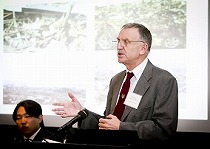
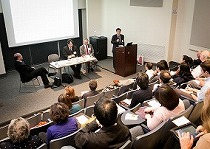 Mr. Norikazu Furukawa, one of the participants from Reitaku’s CMSE, has provided the following report on the remainder of the proceedings:
“After President Nakayama’s opening remarks, perspectives on how service learning was viewed in Japan were offered by the other visiting participants. Professor Luff gave a presentation highlighting possible interactions between Japan and the United States that would promote service learning in an international context. Mr. Furukawa then described the various ways in which service is actualized in Japanese schools and universities. Finally, Professor Mizuno discussed how service learning can strengthen the characters of students. Comments on these presentations were then offered by Professors Joel Scott and Phil Tate of Boston University’s School of Education, before the symposium was thrown open to a question and answer session. Many hands were raised and opinions offered, showing the audience’s keen interest in understanding the best ways to promote service learning.”
On September 30, in company with Professor Marvin Berkowitz of the University of Missouri, Professor Mizuno and Mr. Furukawa made a short visit to Elsah, Illinois, where Principia College, a Christian Scientist University, is located on the top of bluffs that form the Illinois side of the Mississippi river. They toured the beautiful buildings of the campus and made a number of fruitful contacts, before moving on to the University of Missouri – St. Louis, where Professors Berkowitz and Mizuno discussed their joint project on how to measure the impact of moral education on students at Reitaku University.
ccsr-hosts-guests-from-reitaku-university-for-2013-kevin-ryan-symposium
Mr. Norikazu Furukawa, one of the participants from Reitaku’s CMSE, has provided the following report on the remainder of the proceedings:
“After President Nakayama’s opening remarks, perspectives on how service learning was viewed in Japan were offered by the other visiting participants. Professor Luff gave a presentation highlighting possible interactions between Japan and the United States that would promote service learning in an international context. Mr. Furukawa then described the various ways in which service is actualized in Japanese schools and universities. Finally, Professor Mizuno discussed how service learning can strengthen the characters of students. Comments on these presentations were then offered by Professors Joel Scott and Phil Tate of Boston University’s School of Education, before the symposium was thrown open to a question and answer session. Many hands were raised and opinions offered, showing the audience’s keen interest in understanding the best ways to promote service learning.”
On September 30, in company with Professor Marvin Berkowitz of the University of Missouri, Professor Mizuno and Mr. Furukawa made a short visit to Elsah, Illinois, where Principia College, a Christian Scientist University, is located on the top of bluffs that form the Illinois side of the Mississippi river. They toured the beautiful buildings of the campus and made a number of fruitful contacts, before moving on to the University of Missouri – St. Louis, where Professors Berkowitz and Mizuno discussed their joint project on how to measure the impact of moral education on students at Reitaku University.
ccsr-hosts-guests-from-reitaku-university-for-2013-kevin-ryan-symposium



